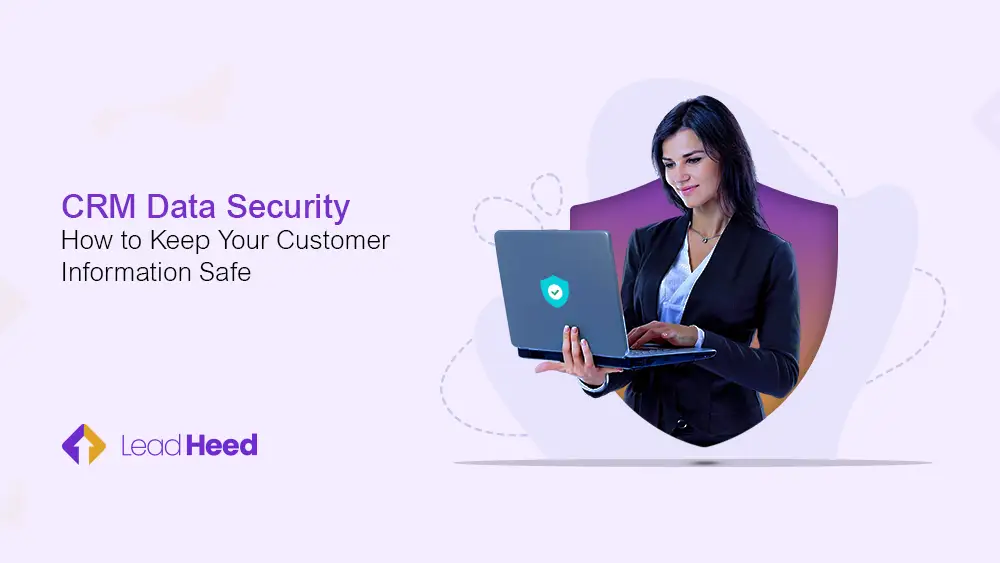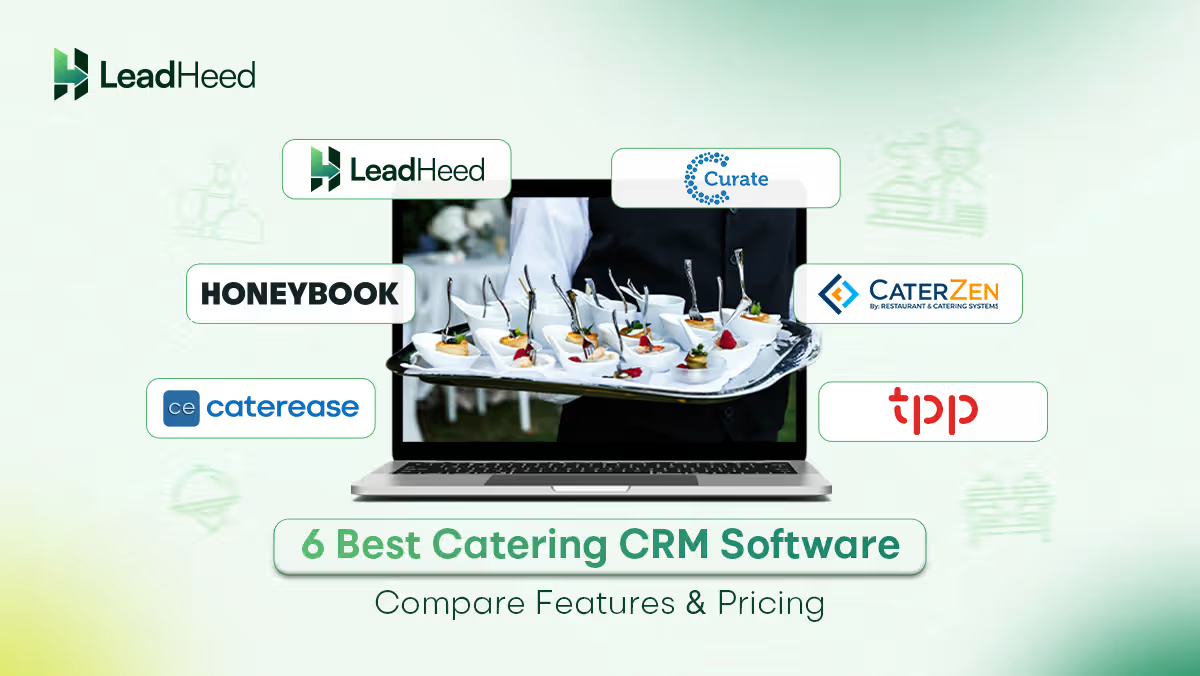Your CRM is the heart of your customer relationships. It stores everything, from names and emails to important sales details. But as online threats grow every day, even one cyberattack can break the trust you’ve built over the years.
Hackers see your CRM as a goldmine, and without the right protection, your business is at a serious risk. That’s why it’s important to secure your CRM system against these threats.
In this blog, we’ll explain what CRM cyber security is, why it matters so much, and how you can keep your valuable customer data safe from online dangers.
What is Cybersecurity in CRM Systems?
Cybersecurity in CRM systems refers to the protection mechanisms implemented to safeguard the valuable customer data stored in a Customer Relationship Management (CRM) platform from cyber threats and unauthorized access. This involves using tools, technologies, and best practices to protect sensitive data, like emails, phone numbers, purchase history, and personal information.
Thus, it prevents your CRM data from being stolen or misused. The main goal of CRM security measures is to maintain trust, implement data privacy, and help companies comply with security regulations.
Why CRM Cybersecurity Matters?
CRM cybersecurity is crucial for businesses because it stores all customer information, including sensitive information such as contact information, purchase history, and other personal details. When this data is leaked or stolen, it can result in financial loss, legal problems, and a tarnished reputation.
Strong security follows data safety rules and helps your business run without problems. Using tools like encryption to protect customer information when it’s stored or sent, and role-based access control (RBAC), ensures that only the right employees can see it.
Common Threats to CRM Systems
Your CRM is like your business’s memory, holding everything about your customers. But just like any valuable system, it can be exposed to sneaky risks if not secured. From hackers breaking in to insiders making mistakes, threats can come from all directions.
In this section, you’ll learn the top risks your CRM faces and how they can impact your business.
1. Data breaches and hacking attempts
The most common threat to CRM systems is data breaches and hacking attempts. This happens when an unauthorized user gets access to the system due to weaker and easier-to-guess passwords. After entering the system, hackers often steal valuable information such as customers’ personal details and their credit card information.
Such breaches can have short-term costs, such as fixing the breach, and long-term consequences like lawsuits or fines.
2. Insider threats and human errors
Not all cyber threats come from outside. Sometimes the biggest threats come from within your business. Employees, contractors, or partners with privileged access to your CRM can accidentally or intentionally compromise sensitive data.
These threats risk data loss, compliance violations, and eroded customer trust. Mitigate them with role-based access, regular security training, and system activity monitoring.
3. Malware, phishing, and ransomware attacks
Major threats like malware, phishing, and ransomware can hurt your CRM system. Phishing tricks people into clicking bad links or sharing passwords, letting hackers into their system. In 2024, phishing caused 40% of data breaches, up from 23% in 2023.
On the other hand, malware can ruin customer info, and ransomware locks your system until you pay.
How to Protect Your CRM System?
Now that you know the threats, it’s time to build your defense. Simple steps like strong passwords, regular updates, data encryption, and employee training can make a big difference.
Let’s explore the essential ways you can protect your CRM from falling into the wrong hands.
1. Implement strong authentication and access controls
It is crucial to implement strong authentication and access controls to protect your CRM. Only authorized individuals must have access to the CRM system.
Set up role-based access controls to limit employees to only the data they need for their jobs. This keeps sensitive information secure from unauthorized access.
Moreover, using strong passwords and multi-factor authentication (MFA) provides an added layer of security.
2. Regular updates and patch management
Maintaining your CRM data security is an ongoing job. Regularly update and patch your system to fix security flaws and block intruders. Failing to apply these updates will leave your system vulnerable. With regular patching and updates, you can keep your CRM safe from new threats.
3. Data encryption and backup strategies
Data encryption turns customer data into an unreadable format, so hackers can’t read it even if they get in. This prevents the information from being misused.
On the other hand, backups save copies of your data in a safe, separate place. It protects against data loss from attacks or system crashes. Together, encryption and backups keep your customer info safe and your business running.
4. Employee training on cybersecurity best practices
Even the most secure CRM system can be vulnerable if your team isn’t trained to use it safely. Data breaches can occur because of simple and avoidable mistakes, such as weak passwords, malicious phishing links, or mishandled data.
That’s why trained employees are as strong as firewalls. When they are regularly trained at workshops, they can recognize threats, use strong login practices, and responsibly handle data.
How to Implement CRM Cyber Security?
To implement CRM data protection, start by understanding your risks, choosing a trusted CRM, and applying smart security steps like access controls, encrypted data, and ongoing monitoring.
Following these steps helps ensure your customer data stays protected and your CRM remains secure at all times.
Step 1: Conduct a risk assessment
Before you implement CRM security measures in your business, you need to understand the risks and potential threats associated with it. These threats involve phishing attacks, malware, ransomware, and other cyberattacks. You should know the impacts of these threats and how you can secure your CRM.
Figure out which risks are most likely to occur and are harmful. Utilize this to prioritize your training on the most sensitive areas to protect your customer data.
Step 2: Choose a secure CRM platform
The next step is to choose a secure CRM platform. Conduct research and identify reputable CRMs that have strong security features, including encryption and multi-factor authentication. These features safeguard your customer data and prevent it from unauthorized access.
Step 3: Establish a security team or hire experts
To enhance CRM system security, establish a dedicated team or engage external experts. These professionals will implement robust security measures, monitor for potential threats, and respond quickly to incidents.
This ensures the protection of sensitive customer data and maintains business continuity. If an in-house team is not feasible, outsourcing to qualified cybersecurity specialists is a highly effective solution.
Step 4: Implement security measures
Make your CRM secure by placing firewalls to prevent unauthorized entry and using antivirus software to recognize threats. You should also encrypt all sensitive data and add multi-factor authentication for extra security.
Plus, you can protect your data transfer by securing APIs. If your CRM resides on-site, lock the hardware with physical security, such as in a secure server room, to safeguard customer information.
Step 5: Monitor and update security systems regularly
Stay one step ahead of cyberattacks by constantly monitoring your CRM for unusual activity. By performing frequent security scans, you can detect vulnerabilities. You should also regularly update all software, plugins, and security tools to respond to emerging threats.
This watchfulness safeguards your customer data and keeps your business protected against evolving cyber threats.
Conclusion
Since your CRM holds valuable customer data, this makes it a big target for online threats. To keep it safe, you need strong security steps like using encryption, updating your system regularly, setting access limits, and training your team.
Choosing a secure CRM platform, setting up safety measures like multi-factor authentication, and constantly monitoring for threats are key to staying ahead. Whether you’re a small business or a large one, CRM data protection isn’t optional; it’s essential for trust, compliance, and long-term success.
FAQs
Why is data security important in CRM?
Data security is important in CRM to protect sensitive information, such as customers’ personal information and financial leaks. This maintains customer trust and builds loyalty.
How do cyber threats affect CRM systems?
Cyberattacks have the potential to seriously harm CRM systems, resulting in data breaches, monetary losses, and damage to one’s brand. These threats destroy customer trust, interfere with corporate operations, and compromise private client information.
What are the best security practices for CRM protection?
The best security practices for CRM protection are:
- Data encryption
- Multi-factor authentication
- Regular updates and patch management
- Role-based access control
- Employee training on data protection best practices
How often should businesses update their CRM security protocols?
CRM security protocols should be reviewed and updated at least quarterly or immediately after any major software update, breach, or policy change. Regular assessments help ensure your CRM system stays protected against new vulnerabilities and meets changing regulatory standards.
Can small businesses also be targeted by CRM cyber threats?
Yes, small businesses are often prime targets for CRM cyber threats because they typically have fewer security resources. Hackers exploit weak security setups, outdated software, and a lack of employee training to access sensitive CRM data.



